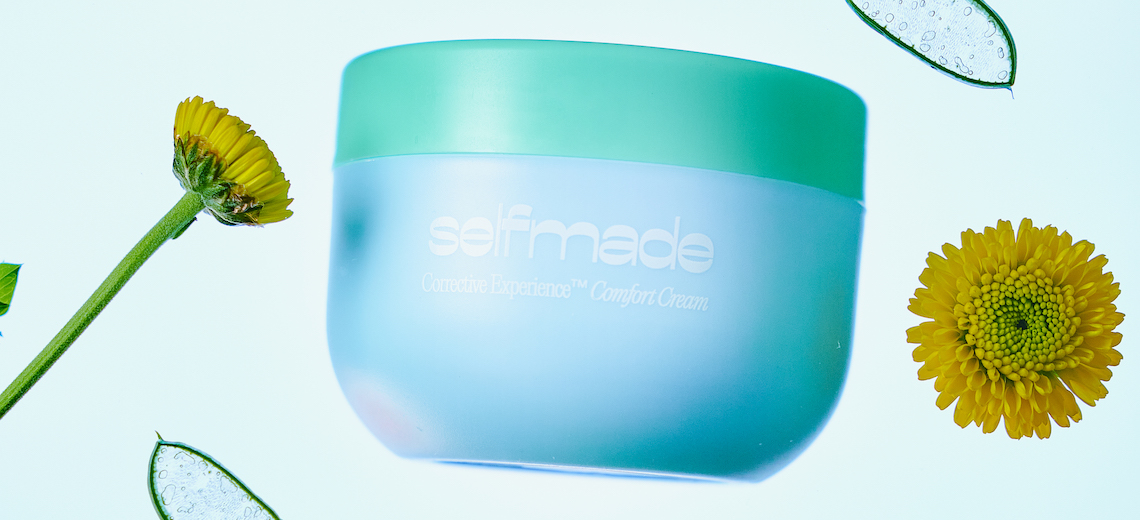Beauty brands’ investment in mental health initiatives is coming full circle with the rise of psychodermatology.
A medical term focused on the psychological causes of skin disorders like trichotillomania and eczema, psychodermatology has traditionally involved doctors treating mental and skin conditions concurrently. Later embraced by cosmetic dermatologists, the concept has now made its way to beauty brands. As a growing number of beauty companies have made mental health a core part of their marketing and branding, some are increasingly touting the benefit most relevant to their line of work: better skin.
“What we see on our skin is one of our first data points about our health,” said Stephanie Lee, founder and CEO of skin-care brand Selfmade. The brand launched its Corrective Experience Comfort Cream on September 6. The product itself claims to “decrease stress levels” in skin by lowering cortisol with its hero ingredient, Cortinhib G. It’s derived from the Helichrysum italicum flower, which is “clinically proven to reduce cortisol levels and reinforce the skin’s barrier,” said Lee.
According to Lee, the brand previously focused on mental health, in terms of the “sensorial experience we want our consumer to have.”
Direct skin improvement from mental health “wasn’t outwardly spoken about,” Lee said. “We’ve evolved that. And the idea and the study of psychodermatology have helped make it much more concrete for folks. They’re like, ‘Oh, I get it now.’”
As it leans into psychodermatology, Selfmade has enlisted dermatologist Dr. Robert Bianchini, who has researched connections between acne and cortisol levels, to be an advisor.
Traditionally, psychodermatology has encompassed issues such as obsessive behaviors or the effects of stress on eczema, psoriasis and acne, and treated by a small field of doctors concurrently specializing in dermatology and psychiatry. Dermatologists are also increasingly embracing the concept in cosmetic treatments, addressing stress as an accelerator of wrinkles, for example.
Ad position: web_incontent_pos1
Celebrity dermatologist Dr. Rose Ingleton, for one, uses psychological techniques as part of her practice on patients like Chrissy Teigen and Adriana Lima. On the Glossy Beauty Podcast in February, she said that when evaluating the causes of skin issues, “It’s not just what I’m seeing on the skin in front of me. It’s what’s going on at home. Are they going through some sort of trauma in life?’” As part of her practice, she refers patients to therapists, including behavioral therapists.
Now, skin-care brands are getting on board. While mental health has been a focus for Rare Beauty, Maybelline and Skin Proud, it has been addressed as a CSR initiative that involves donations to mental health organizations. Selfmade also focuses on “social justice and activism,” when it comes to mental health, said Lee. It works with social justice-oriented psychologists.
Anti-stress skin-care brand Loum, which was launched by parent company Present Life in December 2020, states on its site that its products are made with a “breakthrough Psycho-Dermatology Complex” to address dry and sensitive skin, signs of aging, and acne. It partnered with psychodermatologist Dr. Francisco Tausk, neuropsychologist Dr. Sanam Hafeez and mindfulness expert Michael James Wong to develop its products, which include serums, moisturizers, oils and masks.
The psychodermatology concept being adopted by skin-care brands differs from the use of Instagram-friendly self-care content that proliferated during the pandemic, said Lee. She added that it’s Selfmade’s goal to “stay away from Instatherapy.”
“I know that there’s a whole self-care industrial complex that has colored people’s perception of how brands are approaching this.” Mental health, meanwhile, is “woven into every part of what we’re doing,” she said.




